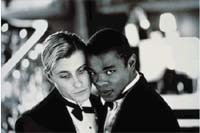
Drama | Filmmaking | Interviews
Original Indie
Written by Francine Latil | Posted by: Anonymous
Julien’s best known works are biographical meditations on the lives of influential black authors. Foremost among them is "Looking for Langston" (1989), widely considered a founding text of New Queer Cinema, which examines the life, politics and sexuality of Harlem Renaissance poet Langston Hughes. The lush black-and-white film alternates between documentary-like realism and dreamy enactments of imagined scenes from the work of Hughes and others.
This and other earlier films have been well received within the experimental, art-film milieu, although Julien’s work has not yet received mainstream attention. As experimental work increasingly retreats from theaters to galleries, Julien, too, has turned to film installations. "Long Road to Mazatlan" (1999), exhibited recently at Grand Arts in Kansas City, takes on the mythologized filmic portrait of the American Southwest so celebrated in Hollywood’s cinema of the Golden Age. The frontier world of this three-screen gallery piece, seen through charged interactions between two cowboys, is transformed through Julien’s attention to desire and the homoerotic gaze. Presently Julien looks forward to the imminent opening of a collection of his short films, photos, and prints at Bard College in New York.
When asked about teaching at Harvard, Julien explains that pedagogy has always had an important place in his work. In Sankofa, the group’s aim was to draw attention to the black subject within contemporary culture. They not only made films, but also marketed and exhibited them with essentially educational aims. He said, "We had three ambitions: first to make films, second to create an intellectual context for their reception, and third to generate a discourse in that space." Julien’s films continue to be both visual and theoretical, initiating a certain debate with academia from without.
Turning the discussion to the state of independent films in the United States, Julien remarks on a recent "queering of the mainstream." Both "The Next Best Thing," with the barely veiled personas of Madonna and Rupert Everett raising a child together, and Hilary Swank’s Oscar win for her performance as Brandon Teena "Boys Don’t Cry" show queer topics settling into a certain mainstream position. But Julien declares "cinema thrives on racial and sexual difference," so pathology is never very far from the picture. In a recent "Sight and Sound" article, critic Ruby Rich considered both sides of the murdering coin as manifested in two attention-getting queer characters in last year’s films; one gets murdered ("Boys Don’t Cry") and one murders ("The Talented Mr. Ripley"). Julien agrees that questions of transgression and normalization are still a focus, and muses that queer characters have become film stereotypes where they once were invisible. Now they’re becoming nearly hypervisible — but in a selectively white, male, middle-class way.
Julien suggests that blockbuster action movies aren’t working for audiences anymore, so ‘quirkier’ films have been able to make headway — as evinced by Hollywood’s recent ‘indie-fication’ with such fare as "Being John Malkovich" and "American Beauty." What, then, is the state of independent film in the States, now that the Sundance Film Festival is when "Hollywood goes skiing"? "It’s hardly independent cinema anymore," Julien says. "It’s more like dependent cinema. There’s no independence from those studio ways of thinking about selling, marketing, financing, and real independent movies become marginalized." Julien thinks Hollywood has recognized certain tendencies in independent film that a mainstream audience may be craving after decades of battering by big-budget blockbusters. "As the absence of money is a major problem for independent cinema, Hollywood was easily able to hijack much of the independent film enterprise. So now we see independent interests linked to corporate machines." It may mean more interesting stuff is getting out there, but exposure as an independent filmmaker now comes at the expense of independence.
With this in mind, I asked about Julien’s next projects. He admits getting funding is difficult and influences the sorts of projects he does. Recently he’s worked on several feature scripts and has been offered direction of multiple projects, though he prefers to work on his own material. He notes things have changed in UK filmmaking as well, with television’s turn to conservatism changing his previously healthy ties to it. The success of "Four Weddings and a Funeral" and other such fare created demand for a certain type of British film, eliminating alternatives. Additionally, Julien notes: "With Derek Jarman’s death, a whole filmmaking process evaporated, and I don’t know if we’ll come upon a time like that again soon."
Meanwhile Julien continues to look for vehicles for future projects. He says he’d like to do something completely different, outside the gender and race categories influential thus far to his work; he imagines working on a project with white or heterosexual characters. Whether it’s towards more gallery work or into feature films of a different nature altogether, Julien seems poised to transform the recurring themes of his work into new modes and to move in different directions.
For more information see http://www.grandarts.com/issac.htm. The Ruby Rich article mentioned above can be read in full at 'Sight and Sound,' http://www.bfi.org.uk/sightandsound/2000_03/queer.html. A copy of 'Looking for Langston' can be purchased at BuyIndies.com.








